Bipolar Disorder
The Importance of Schedule Regularity in Bipolar Disorder
Putting consistency into practice can help with mood stability.
Posted November 14, 2022 Reviewed by Jessica Schrader
Key points
- Consistency can be helpful for mood stability in bipolar disorder.
- People with bipolar disorder are more vulnerable to alterations in their circadian rhythms.
- Keep regular times for those activities that create the framework for your day, such as meal times, sleeping times, and waking times.

Keeping a regular schedule, or a consistent routine, is important for people with bipolar disorder as it can help decrease the risk of mania and depression. What does keeping a regular schedule look like? Ideally, this looks like having regular times for some of the major events that create the framework for your day. This includes regular times that you go to sleep and wake up, regular times that you eat meals, and regular times that you go to work.
Why does having a regular schedule matter in bipolar disorder?
People with bipolar disorder are more vulnerable to disruptions in their circadian rhythms, which are biological processes that operate on a roughly 24-hour cycle and serve a crucial role in maintaining health. Examples of circadian rhythms include the cycle of sleeping and waking and the cycle of regulating body temperature. The circadian system is governed by a “master clock” that is located in a region of the brain known as the suprachiasmatic nucleus, with assistance from other peripheral clocks located in body tissues. These internal clocks synchronize biological circadian rhythms with external cues in the environment, such as light, meal times, and daily routines (i.e., the times that you go to school or work). These environmental cues are referred to as social zeitgebers. According to the social zeitgeber theory, developed by Dr. Ehlers, Frank, and Kupfer, life events that disrupt social zeitgebers can lead to irregularity in circadian rhythms, which can in turn contribute to ongoing, broader desynchronization between circadian rhythms and social zeitgebers, ultimately leading to a mood episode.
To sum it up: As much as possible, keep environmental factors that serve as cues for your circadian system (such as meal times, sleeping and waking times, and work times) stable to decrease the risk of experiencing hypomania or depression.
3 steps for putting schedule regularity into practice
1. Aim for consistency in daily activities. Try to keep the same sleeping and waking times, meal times, and work times on a daily basis. Use these regular times as anchor points for structuring your day, with other things that come up on a given day scheduled around these regular time points.
2. Make use of a calendar. Use a calendar to help you keep track of times for consistent daily events outlined in Step 1. A calendar can also be a helpful tool for scheduling new events that might not fall into your regular routines. The calendar can ensure that you are not planning events at times that might interfere with important anchor points for your day (i.e., sleeping times), and that you are not missing out on any important regular routines, such as meals, with added events or overbooking events in a way that does not feel manageable.
3. Notice how your schedule is impacting your mood. Mood tracking is noted as one of my five steps to help you better understand your bipolar disorder, and I have discussed this tool throughout my blog series because of how useful it can be for people with bipolar disorder. In this case, mood tracking can be an especially helpful tool as you start to track your daily schedule. Notice the relationship between changes in your schedule (such as an altered bedtime or meal time) and your daily mood (i.e., whether you are experiencing depression, hypomania, or neutral mood). Make modifications to your schedule as needed to aim for a neutral (not depressed or hypomanic) mood. For instance, this may mean problem-solving strategies to help you get to bed at a regular time or it may mean having a planned lunch date with your coworker at the same time every day so that you have more incentive to keep a regular midday meal time.
This blog contains the opinions and ideas of the author. It is solely for educational and informational purposes and should not be regarded as a substitute for professional treatment. The author shall not be liable or responsible for any loss or damage allegedly arising from any information or suggestions in this blog.
References
Ehlers CL, Frank E, Kupfer DJ. Social zeitgebers and biological rhythms. A unified approach to understanding the etiology of depression. Arch Gen Psychiatry 1988;45(10), 948-952.
Frank E, Swartz HA, Boland E. Interpersonal and social rhythm therapy: an intervention addressing rhythm dysregulation in bipolar disorder. Dialogues Clin Neurosci. 2007;9(3):325-32.
Grandin LD, Alloy LB, Abramson LY. The social zeitgeber theory, circadian rhythms, and mood disorders: review and evaluation. Clin Psychol Rev. 2006;26(6):679-694.
Takaesu Y. Circadian rhythm in bipolar disorder: A review of the literature. Psychiatry Clin Neurosci. 2018;72(9):673-682.


